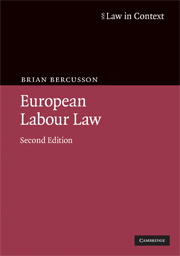Book contents
- Frontmatter
- Contents
- Preface
- Section I Labour law and Europe
- Section II The structure of European labour law
- 8 The institutional architecture of the European social model
- 9 A framework of principles and fundamental rights for European collective labour law
- 10 A framework of principles and fundamental rights for European individual employment law
- 11 The European Court of Justice, the EU Charter of Fundamental Rights and the European social model
- 12 General principles of enforcement of European labour law
- 13 Administrative enforcement of European labour law
- 14 Implementation and enforcement of European labour law and employment policy through the social partners at national and EU levels
- 15 Individual judicial enforcement of European labour law
- 16 Euro-litigation: collective judicial enforcement of European labour law
- 17 The European social dialogue: from dynamism to benign neglect 1993–2008
- 18 External and internal scrutiny of the democratic legitimacy of the European social dialogue
- 19 Threats and challenges to and the future of the European social dialogue
- Section III The futures of European labour law
- Index
- References
9 - A framework of principles and fundamental rights for European collective labour law
from Section II - The structure of European labour law
Published online by Cambridge University Press: 05 June 2012
- Frontmatter
- Contents
- Preface
- Section I Labour law and Europe
- Section II The structure of European labour law
- 8 The institutional architecture of the European social model
- 9 A framework of principles and fundamental rights for European collective labour law
- 10 A framework of principles and fundamental rights for European individual employment law
- 11 The European Court of Justice, the EU Charter of Fundamental Rights and the European social model
- 12 General principles of enforcement of European labour law
- 13 Administrative enforcement of European labour law
- 14 Implementation and enforcement of European labour law and employment policy through the social partners at national and EU levels
- 15 Individual judicial enforcement of European labour law
- 16 Euro-litigation: collective judicial enforcement of European labour law
- 17 The European social dialogue: from dynamism to benign neglect 1993–2008
- 18 External and internal scrutiny of the democratic legitimacy of the European social dialogue
- 19 Threats and challenges to and the future of the European social dialogue
- Section III The futures of European labour law
- Index
- References
Summary
Introduction
Freedom of association was not one of the founding principles and collective bargaining was not one of the operating mechanisms of the common market. It has not been easy to perceive in the emerging law of a European common market a role for collective organisations of labour and capital. Accompanying this conceptual disarray about the nature of the law governing collective labour relations at EU level has been scepticism as to the feasibility of development of a system of industrial relations at the level of the EU. The result has been a general pessimism about the prospects for collective labour law in the EU. Much of the confusion and some of the scepticism are due to the absence at EU level of legal measures and institutional and organisational structures recognisable in terms of traditional and familiar collective labour laws and national industrial relations systems.
Instead, up to, and to some extent, even after the adoption of the Protocol and Agreement on Social Policy attached to the Maastricht Treaty on European Union, the collective labour law of the EU was to be found embedded in a variety of legal measures which did not have the regulation of collective labour relations as their primary objective. These measures include those aimed at harmonising national labour laws, or regulating the implications for labour of transnational economic activities.
- Type
- Chapter
- Information
- European Labour Law , pp. 288 - 330Publisher: Cambridge University PressPrint publication year: 2009



